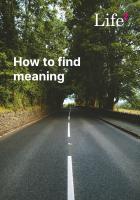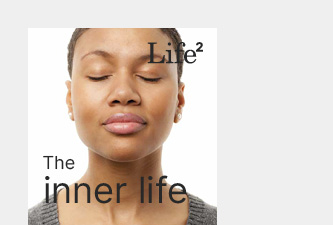
How to find meaning
Written by Richard Docwra
What is the meaning of life? Many of us have struggled with this question at some point, and this booklet aims to help you explore it, so that you can live a meaningful and purposeful life.
We will discuss how to think about this question, and what some of the obstacles might be to finding meaning in the modern world. We will also explore some of the common things that give people meaning, and how you can build a sense of real meaning in your own life.
This publication is an extract from the book ‘Life – and how to think about it’ by Richard Docwra, which you can buy here
How to find meaning
Introduction
What is the meaning of life?
This is a question most of us have wrestled with at some point or another, and is perhaps the one that people have struggled with the most throughout the ages. A range of answers have been suggested – including ‘Sex and drugs and rock and roll’ and ‘42’ (the latter courtesy of the great Douglas Adams) - but you may feel that neither of these provide a satisfactory answer for you.
In this booklet we will explore this question, and show how we can each find meaning in our lives. We will also briefly explore some of the common things that give people meaning.
What are we seeking?
Before we start, it will help if we can be clearer about what we are seeking when we ask ourselves what the meaning of life is. Is it really an answer to a simple question? What is ‘meaning’ anyway?
What we really seem to be asking when we pose questions such as ‘what’s the meaning of life’ or ‘what’s the point of life?’ is whether there is any particular purpose for which we are each alive.
And this is a massively important question for nearly all of us, even though we may choose to articulate it in different ways. To see how important it is, we only have to consider what it feels like (or would feel like) to be without a sense of purpose in life.
Many people can roll along through life just enjoying the experience of being alive, and as we will see, this is an important attitude to cultivate. But, at the same time, many of us also need to feel a sense of purpose to our lives - a reason for existing.
At its most extreme and tragic level, some people who feel a massive hole in their lives without a reason for existing decide they have no reason to continue living.
For some people, a lack of reason for existing can cause a sense of emptiness, a gaping hole in their lives that brings a sense of yearning to fill it. With an increasing sense of desperation to fill this void but no idea of how to do so, they may take a random, scattergun approach and try to fill it with anything they can, or find ways of trying to avoid thinking about it. Many of these options may not be what they really need and some - such as alcohol and drugs - may actually exacerbate their misery and sense of worthlessness.
So, finding meaning matters to us. We need a reason to get up every day rather than pull the covers over our head and stay in bed. We need to feel fulfilled and valued. We want a sense of identity and pride in who we are. We don’t of course need a clear sense of purpose in our lives to feel a sense of value and pride in ourselves, but for many of us it certainly helps to make us feel like worthwhile human beings.
In some ways, it would be much easier if there was a clear answer to the question of why we exist. Especially if everyone’s life had a very clear aim, which could be measured and it could be easily worked out if you’d achieved this aim or not.
Over the years, many people have sought to find clear answers to this question - and we can find ourselves living within cultures, nations, religions and political systems that contain quite specific views on what should give our lives meaning. As a result, we absorb these ideas and carry them with us as individuals, even though we may not realise it.
For example, political movements (from communism to liberalism) have sought to gain people’s loyalty to a particular view of how the world should be, and each brings with it a view of what role each of us should play within this system - and hence, what gives meaning to our lives. This doesn’t just apply to the more authoritarian political movements like communism. Even the market-driven liberal system we live under at the moment has a sense of what matters in life - namely, individual freedom, achieved through continuous economic growth and minimally regulated financial markets. This overarching priority ‘trickles down’ into our culture’s dominant view of what’s important in our individual lives, such as material success and career achievement.
Religions also carry assumptions about the meaning of life. At the most basic level, some monotheistic religions argue that the meaning of life is to live in a way that is pleasing to their god. Some religions promise a reward in the afterlife for doing this. But even beyond this rather reductive level, religions have had an influence on what we each view to be meaningful, worthwhile lives. For example, influencing our ideas on how we should behave with regard to sexuality, work, ethics and many other areas.
All of these ideas and approaches have tried to argue that there is some objective reason or purpose for existence, and that following their ideas will enable you to find meaning. The problem is, there is no objective reason or purpose for existence. And the ‘meaning’ that each of these ideologies offers - however convincing it may be - is ultimately just made up.
Any movement or ideology - whether political, religious or other - that claims to have found an objective reason is deluded. And, what’s worse, it’s making this claim of ‘truth’ at the expense of the infinite other ways of finding meaning or reason in life. It therefore cuts its followers or citizens off from these other ideas, or draws an arbitrary line in the sand that will inevitably cause conflict with other ideologies whose views differ from this. Any movement or ideology that claims to have knowledge of an objective truth in matters that are actually arbitrary opinion is a catalyst for conflict, persecution and human misery.
So, in one way it could be argued that many of these attempts to find clear answers to the question of meaning in life have been very successful, insofar as they have influenced billions of people to adopt their views of what matters in life. They may have been a great deal less successful for many of the people living within them however, as they have caused them immense anxiety and pain when trying to live in line with them - with ideas of meaning that aren’t really their own, and being pressurised to follow particular views of life, without being given a chance to really think about what gives them meaning personally. The time has come for people to be able to think clearly about what really matters to them - without their views being completely moulded by the influence of others. The aim of this chapter is to help you do this by first challenging some of the assumptions overarching you about meaning in life.
It would be even more gratifying if one could identify a clear and specific objective aim that you - and only you - had in life. At its most extreme level, we can see how this sort of attitude could lead to an extreme level of self-delusion or a messiah complex - the idea that you are the ‘chosen one’ to achieve a particular goal or aim. And that, as you have this clear sense of direction and others don’t, you and your mission are therefore more important than other people. Individuals who have harboured delusions like this (and their followers) have been responsible for some of the great mistakes and horrors of human history.
Thinking about meaning
So what is a more realistic way to think about meaning?
Let us begin with the brutal fact - as far as we know, life has no specific meaning. We are a group of life forms made of the same stuff as all the inanimate, lifeless objects in the universe. Life on Earth emerged by chance and a fortunate set of conditions, and we have evolved over billions of years to the creatures we are today. There is no great purpose to why we are here, despite what believers in the supernatural would have you believe.
Given this reality, the meaning of life is subjective - it is the meaning each of us attributes to our own life. So, we create the meaning in our own lives.
And although there is no objective, external meaning to our lives, there is plenty of meaning to be found within them, as conscious creatures with particular senses, instincts, needs and ideas. Later we will explore some of the things that might give us most meaning - as well as some of the things that don’t seem to.
Obstacles to finding meaning
Many of the things that give us meaning are actually quite simple and sitting right in front of our eyes - for example, human relationships. We often find ourselves unable to see these things though, and can find ourselves wandering through life without a sense of meaning or struggling to find it whilst desperately seeking it. Our inability to find meaning in life could be for a number of reasons.
To start with, we may be searching for the wrong thing. Our search for meaning in life can be elusive if we become fixated on the idea of finding ‘meaning’ itself, as this doesn’t exist as a specific thing - it is simply a made-up human concept. It will therefore slip through our fingers if we try to grab it. To find meaning, we have to focus on the things that give us meaning - not on the idea of meaning itself.
Another important reason why people might struggle to find meaning in their lives is that they are confused about what might give them meaning. This can be a particular challenge in the modern world, as there are many strong social, cultural and commercial influences encouraging us to seek meaning in certain things that don’t actually bring much meaning for most people, such as wealth or material consumption, for reasons we discussed earlier in this chapter.
Take wealth, for example. Many people believe that having greater wealth brings greater happiness and fulfilment. So they sacrifice their lives striving for it. Yet, the evidence from comparing income and happiness levels of different countries shows that beyond a certain level of average wealth - around $20,000, according to Professor Richard Layard - “higher average income is no guarantee of greater happiness.”[1] So, we’re unlikely to find meaning simply in the pursuit of material wealth.
Yet the influences (such as advertising) that pedal these spurious ideas of meaning are extremely powerful, as they surround us in our daily lives, and represent ‘reality’ for many people. They can act as a fog that makes it harder for us to see what really gives us meaning, and can distract us with sparkly things that may give us short-term pleasure but fail to satisfy us or ultimately give us real meaning.
We can also end up constantly comparing our own lives with those of other people. This is not only unrealistic but can also be harmful to us as it can cause us stress and unhappiness when we fail to achieve these impossible goals. It is an ultimately unfulfilling approach anyway, as it is about what others have, not what we really want ourselves.
In the end, we should seek to make our own meaning in life - without being influenced by external forces.
Critical thinking can play an important role in helping us to recognise the external influences on us and think clearly about what really matters to us. To find out more about this, read Richard Docwra’s book ‘Life – and how to think about it’.
So, when you do the exercise at the end of this chapter to help you reflect on what gives you meaning, you need to be really honest with yourself about what matters to you and what gives you pleasure. Try to ignore the influence of wider society or what other people think - or indeed your own judgements of whether the priorities you come up with are ‘worthwhile’ or not - and just lay them out honestly. These will be your real priorities. Live in line with these and you won’t go too far wrong, as you’ll be living on your own terms.
How to find meaning
The solution is therefore for each of us to stand back from the influences and distraction around us, and be honest with ourselves about what really does give us meaning.
It’s important to note that you don’t have to be a philosopher in order to find meaning in life. You don’t need to overthink this. You just need to be able to be honest with yourself about what gives you a sense of purpose, fulfilment and enjoyment in life. You don’t have to emerge with any great, profound and snappy soundbite to describe it either - you can keep it in your head as a fluid, rough idea of what matters to you. And remember - you are answerable to no-one else for what gives you meaning in life, so don’t try to judge your ideas against those of other people.
To help you identify what really matters to you, try this quick thought experiment. Imagine yourself in many years’ time, lying on your deathbed. When you look back over your life what will be the things that gave you most meaning? Things you wished you’d given more time to?
Once you’ve gained a sense of what gives you meaning in life, you can then choose to live in a way that embraces it and is consistent with it. It’s about living in line with your priorities - so that you can look back on a life well lived. This doesn’t mean striving or setting yourself goals to live in line with what gives you meaning - it doesn’t need to be a chore. It could simply be about choosing to do more of the things that give you meaning and fewer of the things that don’t.
For example, if you spend most of your time at work but place a higher value on family life, try to redress the balance. There may be a number of ways you can do this, including changing your working hours, working from home more often or imposing a rule on yourself to not work at weekends or evenings.
What gives us meaning?
You will of course need to answer this question for yourself, but in this section we can summarise some areas that seem to provide meaning in many people’s lives - no matter what their culture or background.
You’ll notice in this section that we’ve not noted specific life goals (such as ‘win the Nobel peace prize’ or ‘have three children’), even though they may be meaningful to some people. This is because setting goals for your life can be counterproductive, as you may not be in control of whether you achieve them or not (this applies to both examples above), and they leave you with potential to brand your entire life as meaningless or a failure if you’ve been unable to meet them. It can be fulfilling to continually challenge ourselves but basing our entire lives around goal fulfilment is likely to lead to disappointment and regret.
As discussed already, our lives are packed with potential sources of meaning as conscious, social creatures with particular senses, instincts, needs and ideas. With this in mind, some of the things that might give our lives meaning are:
- Human relationships - many people class their friendships, family and personal relationships as among the most important things in their lives. Yet it’s amazing how much we can neglect or overlook them in favour of other things that give us less meaning.
- Making a contribution - doing things to help other people, participating in our communities or trying to make the world around us better provides many people with a great deal of fulfilment. It also enables them to feel they have left some sort of legacy once they have passed away.
- Savouring the experience of life - people use many terms to describe their particular ways of savouring the experience of life - including mindfulness, reflection and contemplation. But it ultimately boils down to some common ideas, such as the practice of contemplating our existence and acknowledging our sense of awe and wonder about it.
Many of us tend to be so busy and absorbed in the pressure and rush of everyday living that we rarely (if ever) take time to step back from our lives and appreciate the remarkable fact that we are alive and what this really means.
Learning to appreciate life like this, and reminding yourself about it regularly, can be one of the great pleasures of life, and can add a real sense of meaning to your life. No matter how difficult everyday living may be sometimes, seeing our lives in this wider context can help us to put everyday worries into perspective and give us a great sense of calm.
We should also remember to savour the experience of being alive, as well as the individual experiences we have as we go through them. This doesn’t always mean sitting in a field with our legs crossed though. We can appreciate the busier aspects of life as well as the quieter ones. For example, it can be satisfying to reflect on the enjoyment we are feeling when we are in the middle of busy, social experiences with other people, such as parties. Taking a few seconds to do this occasionally can enable us to ‘check in’ with ourselves during these experiences and fully appreciate them.
Research has shown that practising awareness of sensations, thoughts and feelings can improve both the knowledge we have about ourselves and our well-being.
- Pleasure - it might seem frivolous to suggest this following such a reflective point, but experiences of pleasure can lend a great deal of meaning to our lives. From sensory pleasure - such as enjoying food or living in a warm climate - through to intellectual pleasures such as reading good books.
- Creativity - both the process of creativity and the completion of a creative project can be highly fulfilling. There is an almost boundless range of ways we can be creative, including cooking, writing, music, gardening and imagining.
- Learning - we are lucky enough to exist for 80 years or so, therefore one aspect of what it might mean to live a good life is to try to better understand the world around us and the life we are living. This could give us a greater sense of perspective, is using the intellectual faculties we have and could bring a richer existence to us during the time we are alive.
- Applying ourselves - applying ourselves, our concentration and our efforts to tasks and projects can give us a great sense of meaning and fulfilment - not just in the achievement or completion of the tasks themselves, but in the process of undertaking them in the first place. This could include learning a skill such as a language or musical instrument, or simply undertaking an intellectual task such as a crossword or reading a book.
- Enjoying nature - many people find that having a regular connection with nature is essential to the sense of fulfilment they get from life. This may be through walking in the countryside, stopping to appreciate a beautiful view or having a pet. It is another component of ‘savouring the experience of life’.
- Exercise - there is great meaning to be gained from exercise of any sort. It can provide us with a chance to apply ourselves, experience nature, socialise and savour the experience of being alive - but above all can simply make us feel good - both physically and mentally, as well as improving our health in both the short and long-term.
As you can see from some of the ideas above, we don’t need to don’t need become philosophers and spend years wrestling with the abstract idea of the ‘meaning of life’ before we can actually get meaning from it. At the most basic level, if you simply enjoy your experience of life, you will have got meaning from it!
But if you want to think about it a bit further, take some quiet time to reflect on what gives your life meaning - and then build more of these things into your life, and try to worry less about the things that aren’t on this list that you may have previously spent too much emotional energy on - for example, worrying about what you have achieved in relation to other people.
Action - reflect on what gives you meaning in life
Take yourself somewhere peaceful and quiet, perhaps in nature, away from the influence of other people. Have a think about what matters to you in life and what gives you pleasure. Try to consider this honestly, without judging yourself or wondering what other people might think about your choices. If you want to, write a short list (up to around 5) of these things. If you have time, perhaps also consider things that you’ve considered as priorities up to now that, upon reflection, have less meaning for you. Then consider how to build the real priorities into your life more - and release time on the old priorities to make more time for them.
Conclusions
Finding meaning is an important part of our individual lives. There is no objective ‘meaning of life’ - we need to find this for ourselves.
To help each of us identify what really gives us meaning in life, we need to challenge the assumptions about this issue that we have (often unwittingly and automatically) inherited from various ideologies, institutions and people around us over our lives. When we do this, and think for ourselves about what really matters to us, without judging these choices, we can live a life of greater meaning.
And this does not have to be a process of intellectual and personal struggle over a lifetime - we just need to reflect honestly about what matters to us in life, and then live in a way that prioritises these things.
Copyright Life Squared 2021
[1] Happiness - lessons from a new science, Richard Layard, Penguin, London 2006, p.34
You May Also Like

The inner life
A no-nonsense guide to how you can explore your inner world.

Quotes for life
Some invaluable insights and ideas from famous (and less known) thinkers.

Freedom unwrapped
How the idea of 'freedom' can be manipulated by people.

